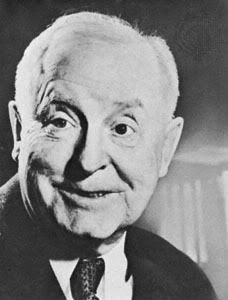
Incredibly enough, you're wrong. Despite the obvious location-specific title, the talks actually seem to have been named after these guys:


Follow me over the flip to find out more, and what this all has to do with Obama.
William Allen White (1868-1944), the gentleman on the left, was a prominent newspaper publisher and columnist who was active in Republican Party politics from 1896-1944. White was a close friend of President Theodore Roosevelt, and he played a leading role in the latter's 1912 run for a third term under the banner of the Progressive Party. In that race, Roosevelt scored an impressive 27% of the vote, defeating sitting President William Howard Taft and coming in second to Democrat Woodrow Wilson. Wilson's closest aide was the mercurial Colonel Edward House (1858-1938) -- that'd be the gentleman on the right.
Given House's reclusiveness, it's not surprising that the two Presidential aides hadn't met before April 11, 1917. But on that day, they were pressed into service for their country to solve a serious political crisis.
America had entered the three-year-old World War I just a week earlier, on April 4. Almost immediately, Roosevelt, a hero of the Spanish-American War, began agitating to get back in uniform. Wilson was alarmed at this development, because Roosevelt, who had made a full reconciliation with the Republican Party in 1916, was rumored to be the leading Presidential nominee for the Republicans in 1920. Wilson didn't want to let Roosevelt display his heroism on the battlefield, but at the same time he was worried that if he didn't give the ex-President a military commission, Roosevelt would retaliate by barnstorming the country denouncing Wilson's war leadership.
The result was the little-known White-House talks. Yale historian Sanford Robinson, in his seminal biography The Life and Times of Edward Mandell House (1959), describes the occurrence on p. 235-236:
The question was, would Wilson allow Roosevelt to fight? And if he did not, would the surly ex-President raise such a ruckus as to seriously jeopardize the commander-in-chief's legitimacy?
With the situation seemingly at an impasse, Wilson dispatched House to meet with William Allen White, a Kansas newspaper publisher who was a close confidant of Roosevelt's. In a series of secret meetings at the President's residence, the two men, "grey eminences" to the two most powerful politicians of the age, hammered out an accord that would satisfy both sides. The venerable TR would not go overseas, but he would be able to stump the country promoting war bonds as an official emissary of the Wilson administration, which would allow him to raise his profile for a projected 1920 Presidential run while denying him the status of war hero that would all but guarantee his election. ...
In retrospect, Roosevelt's premature death in 1918 made the whole question moot. But at the time, this backroom deal between two of the Progressive Era's keenest political minds was viewed as having averted disaster. Dubbed the "White-House Talks" by historians, the event has served as a blueprint for numerous secret meetings of political opponents, which are now routinely referred to as "White House talks" (the hyphen having been omitted through a confusion with the President's official residence).
Robinson's research is impeccable (the footnote to this passage goes on for half a page), but I disagree with his value judgment about the ultimate worth of the event he describes. To me, the White-House talks stand for everything I dislike in politics: the making of decisions through anti-democratic backroom deals without consulting the public. Yet my chosen Presidential candidate, Barack Obama, seems poised to make numerous such undemocratic deals in the name of faux "unity." I don't want Obama talking to former Bush allies, I want him prosecuting them. There's a time for unity, and a time for throwing down the gauntlet and declaring that there's a difference between right and wrong.
I support Obama because of his political courage and his inspiring rhetoric, but I don't plan to stop criticizing his unity message just because I've endorsed his candidacy. Though I harbor no illusions that he'll listen to my rantings on a blog, I hope that President Obama will learn the right lesson from the White-House talks: politics is better conducted out loud and in full view of the public.
Labels: Jeremy Young
Agreed, Jeremy. Beyond being fundamentally undemocratic and immoral (when dealing with war criminals in the Bush Administration), backroom deals can have serious political consequences, as Alterman's When Presidents Lie reveals (re: foreign policy).
P.S. It being April Fool's Day, I wasn't sure if you were serious about the "White-House Talks" thing. Actually, I'm still not sure, and I'm too lazy to fact check...
Lisa Pease on 4/01/2008 2:48 PM:
I think it has to be an April Fools day joke, but it's so good we should spread this around! ;-)
Btw - speaking of spreading things around - please watch my first movie! 1.5 minutes total - a little skit some friends and I put together based on a sketch someone posted over at BoomanTribune.com.
http://www.youtube.com/watch?v=lQh8__dCxeE
GG, Lisa, you win the prize. Ahist, I'm afraid you've been punk'd. Try asking some of your Americanist friends whether they've ever heard of the eminent Yale historian Sanford Robinson or his seminal 1959 work The Life and Times of Edward Mandell House.
Lisa, I saw your movie and it was fabulous. Why not post it on the main page?







There's another problem to the White-House talks which Obama (and Clinton) should be concerned with: the fundamentally untrustworthy nature of the Republican opposition. I wouldn't assume anything said to a Republican political operative was going to be kept secret, transmitted honestly or that anything they said would be reliable or upheld if it was to their advantage to do otherwise.